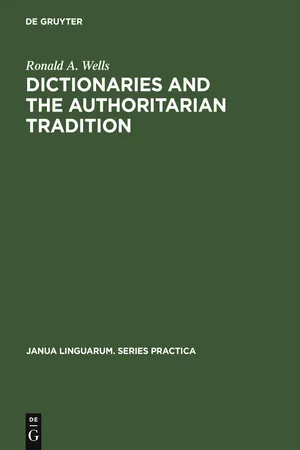
This is a test
- 129 pages
- English
- PDF
- Available on iOS & Android
eBook - PDF
Dictionaries and the Authoritarian Tradition
Book details
Table of contents
Citations
Frequently asked questions
At the moment all of our mobile-responsive ePub books are available to download via the app. Most of our PDFs are also available to download and we're working on making the final remaining ones downloadable now. Learn more here.
Both plans give you full access to the library and all of Perlego’s features. The only differences are the price and subscription period: With the annual plan you’ll save around 30% compared to 12 months on the monthly plan.
We are an online textbook subscription service, where you can get access to an entire online library for less than the price of a single book per month. With over 1 million books across 1000+ topics, we’ve got you covered! Learn more here.
Look out for the read-aloud symbol on your next book to see if you can listen to it. The read-aloud tool reads text aloud for you, highlighting the text as it is being read. You can pause it, speed it up and slow it down. Learn more here.
Yes, you can access Dictionaries and the Authoritarian Tradition by Ronald A. Wells in PDF and/or ePUB format, as well as other popular books in Languages & Linguistics & Linguistics. We have over one million books available in our catalogue for you to explore.
Information
Table of contents
- Preface
- 1. THE ORIGINS OF ENGLISH LEXICOGRAPHY
- 1.1. Early word lists
- 1.2. The first English dictionaries: the ‘hard words’ tradition
- 1.3. The comprehensive English dictionary
- 1.4. Inductive method
- 1.5. The historical principle
- 2. THE AUTHORITARIAN TRADITION IN LANGUAGE: ENGLAND
- 2.1. Toward an academy of the English language
- 2.2. The need for an English dictionary
- 2.3. The dictionary as authority: Samuel Johnson
- 2.4. The reception of Johnson’s Dictionary
- 3. THE AUTHORITARIAN TRADITION IN LANGUAGE: AMERICA
- 3.1. Proposals for an American academy
- 3.2. Authoritarian attitudes and Anglophilia
- 3.3. Noah Webster’s linguistic patriotism
- 3.4. Spelling reform
- 3.5. Webster’s influence on American spelling
- 3.6. Webster’s American Dictionary
- 3.7. The ‘war of the dictionaries’
- 3.8. Linguistic conservatism: renewed efforts for an American academy
- 4. THE SECOND DICTIONARY WAR: WEBSTER’S THIRD NEW INTERNATIONAL DICTIONARY
- 4.1. The new authoritarianism
- 4.2. Three reviews
- 4.3. Rebuttal
- 5. LEXICOGRAPHY AND ENGLISH USAGE
- 5.1. Usage information in the early dictionaries
- 5.2. The authority of the dictionary
- 5.3. Usage orientation in modern dictionaries
- 5.4. The situational dimension
- 5.5. The situational and modal dimensions confused: the colloquial label
- 5.6. The usage note
- 5.7. The verbal illustration
- 5.8. The synonymy
- 5.9. Conclusions
- Bibliography